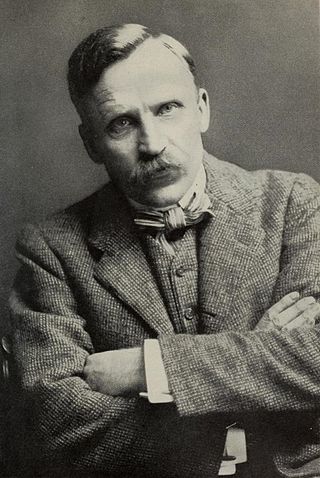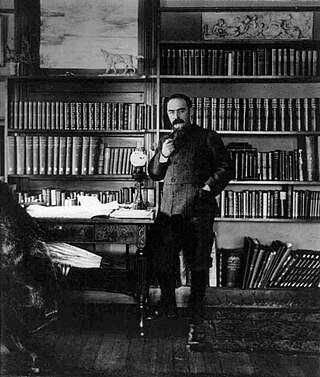
Joseph Rudyard Kipling was an English novelist, short-story writer, poet, and journalist. He was born in British India, which inspired much of his work.
This is a bibliography of works by Rudyard Kipling, including books, short stories, poems, and collections of his works.

"If—" is a poem by English poet Rudyard Kipling (1865–1936), written circa 1895 as a tribute to Leander Starr Jameson. It is a literary example of Victorian-era stoicism. The poem, first published in Rewards and Fairies (1910) following the story "Brother Square-Toes", is written in the form of paternal advice to the poet's son, John.

Samuel Sidney McClure was an American publisher who became known as a key figure in investigative, or muckraking, journalism. He co-founded and ran McClure's Magazine from 1893 to 1911, which ran numerous exposées of wrongdoing in business and politics, such as those written by Ida Tarbell, Ray Stannard Baker, and Lincoln Steffens. The magazine ran fiction and nonfiction by the leading writers of the day, including Sarah Orne Jewett, Mark Twain, William Dean Howells, Joel Chandler Harris, Jack London, Stephen Crane, William Allen White and Willa Cather.

The Barrack-Room Ballads are a series of songs and poems by Rudyard Kipling, dealing with the late-Victorian British Army and mostly written in a vernacular dialect. The series contains some of Kipling's best-known works, including the poems "Gunga Din", "Tommy", "Mandalay", and "Danny Deever", helping consolidate his early fame as a poet.

"Danny Deever" is an 1890 poem by Rudyard Kipling, one of the first of the Barrack-Room Ballads. It received wide critical and popular acclaim, and is often regarded as one of the most significant pieces of Kipling's early verse. The poem, a ballad, describes the execution of a British soldier in India for murder. His execution is viewed by his regiment, paraded to watch it, and the poem is composed of the comments they exchange as they see him hanged.

"The Absent-Minded Beggar" is an 1899 poem by Rudyard Kipling, set to music by Sir Arthur Sullivan and often accompanied by an illustration of a wounded but defiant British soldier, "A Gentleman in Kharki", by Richard Caton Woodville. The song was written as part of an appeal by the Daily Mail to raise money for soldiers fighting in the Second Boer War and their families. The fund was the first such charitable effort for a war.

"Recessional" is a poem by Rudyard Kipling. It was composed for the Diamond Jubilee of Queen Victoria, in 1897.

"Mandalay" is a poem by Rudyard Kipling, written and published in 1890, and first collected in Barrack-Room Ballads, and Other Verses in 1892. The poem is set in colonial Burma, then part of British India. The protagonist is a Cockney working-class soldier, back in grey, restrictive London, recalling the time he felt free and had a Burmese girlfriend, now unattainably far away.

Puck of Pook's Hill is a fantasy book by Rudyard Kipling, published in 1906, containing a series of short stories set in different periods of English history. It can count both as historical fantasy – since some of the stories told of the past have clear magical elements, and as contemporary fantasy – since it depicts a magical being active and practising his magic in the England of the early 1900s when the book was written.
In the British Army, a gentleman ranker is an enlisted soldier suited through education and social background to be a commissioned officer or indeed a former commissioned officer. Rudyard Kipling titled one of his poems, which was published in 1892, "Gentlemen-Rankers".
The Definitive Edition of the verse of Rudyard Kipling (1865–1936) was published in 1940 in London by Hodder and Stoughton, Ltd and in Edinburgh by R. R. Clark. It is a one-volume collection and was printed on India paper.

A fog bell is a navigation mark used as an audible aid to navigation in seafaring, especially in fog and poor visibility. Floating navigation signs with bells are called bell buoys. On ships, the ship's bell is used for sound signals. Due to more suitable sound generators, but also the development and spread of radar, satellite navigation and electronic charting systems, fog bells have lost their importance for maritime navigation.

"On the Road to Mandalay" is a song by Oley Speaks (1874–1948) with text by Rudyard Kipling (1865–1936).
"In the Neolithic Age" is a poem by the English writer Rudyard Kipling. It was published in the December 1892 issue of The Idler and in 1896 in his poetry collection The Seven Seas. The poem is the source of the quotation: "There are nine and sixty ways of constructing tribal lays, / And every single one of them is right."

The Five Nations, a collection of poems by English writer and poet Rudyard Kipling (1865–1936), was first published in late 1903, both in the United Kingdom and the U.S.A. Some of the poems were new; some had been published before, sometimes in different versions.
A Choice of Kipling's Verse, made by T. S. Eliot, with an essay on Rudyard Kipling is a book first published in December 1941. It is in two parts. The first part is an essay by American-born British poet T. S. Eliot (1888–1965), in which he discusses the nature and stature of British poet Rudyard Kipling (1865–1936). The second part consists of Eliot's selection from Kipling's poems.
"Dane-geld" is a poem by British writer Rudyard Kipling (1865-1936). It relates to the unwisdom of paying "Danegeld", or what is nowadays called blackmail and protection money. The most famous lines are "once you have paid him the Danegeld/ You never get rid of the Dane."
"McAndrew's Hymn" is a poem by English writer Rudyard Kipling (1865–1936). It was begun in 1893, and first published in December 1894 in Scribner's Magazine. It was collected in Kipling's The Seven Seas of 1896. Some editions title the poem "M'Andrew's Hymn".
"The Mary Gloster" is a poem by British writer Rudyard Kipling (1865-1936). It is dated 1894, but seems to have been first published in his 1896 collection The Seven Seas.













